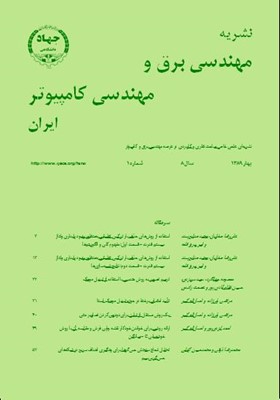بهبود کيفيت سرويس و کاهش توان مصرفی در شبکههاي اقتضايي از طريق کنترل توزیعی توان با در نظر گرفتن هزينه توان و SINR
محورهای موضوعی : مهندسی برق و کامپیوتررویا هراتیان 1 * , احمدرضا شرافت 2
1 - دانشگاه تربیت مدرس
2 - دانشگاه تربیت مدرس
کلید واژه: روش مبتني بر هزينه شبكههاي بيسيم اقتضايي كنترل توان نظريه بازيها,
چکیده مقاله :
در اين مقاله مسأله كنترل توزيعي توان در شبكههاي بيسيم اقتضايي در لایه فیزیکی با هدف بهبود کیفیت سرويس کل شبکه و کاهش توان مصرفي بررسي ميشود. اين مسأله را با كمك نظريه بازيها تحليل ميکنيم و براي رسيدن به هدف بهبود کیفیت سرويس کل شبکه و کاهش توان مصرفي، راهکاري را ارائه مينماييم. هر كاربر در شبکه دارای تابع بهرهای است كه مقدار آن بهصورت کمی بیانگر كيفيت سرويس دریافتی آن كاربر است و بهصورت تابعي از نسبت سيگنال به تداخل به اضافه نويز كاربر تعريف ميشود. هر کاربر با هدف بيشينهکردن مقدار تابع بهره خود، مقدار سطح توان ارسالي خود را انتخاب ميکند. بنابراين توان ارسالي كاربر، هم بر تابع بهره آن كاربر و هم بر تابع بهره ساير كاربران تأثيرگذار است. اين اثر متقابل كاربران بر روي يكديگر را ميتوان بهوسيله نظريه بازيها تحليل كرد. بيشينهكردن تابع بهره هر کاربر بهطور خودخواهانه با بيشينهكردن بهره كل شبكه مغاير است. در اين مقاله براي حل اين مشكل از روش مبتني بر هزينه استفاده کردهایم كه در آن با كمكردن تابع هزينه از تابع بهره، بهره كاربر مشخص میشود. رفتار متقابل كاربران را در اين شرايط نيز به كمك نظريه بازيها تحليل کرده و الگوريتمي توزيعي براي بهروز کردن توان کاربران ارائه کردهايم. همچنين با كمك شبيهسازي، بيشينهشدن کیفیت سرويس شبكه و کاهش توان مصرفي با كمك روش مبتني بر هزينه را نشان دادهایم.
We propose a scheme for improving QoS and reducing transmit power in wireless ad hoc networks by utilizing the signal-to-interference-plus-noise-ratio (SINR) and a pricing function that is proportional to the transmit power of each user. The performance of our proposed method is analyzed by using game theory, where each user’s quality of service is a function of its SINR. The utility function for each user is defined by its desired SINR minus a pricing to provide adequate incentive for each user to choose its power level in such a way to maximize the aggregate of all users’ utilities (total network utility) instead of selfishly maximizing its own SINR. Simulation results show that the performance of the network is improved while the total power consumption is reduced.
[1] M. S. Alouini and A. J. Goldsmith, "Capacity of Rayleigh fading channels under different adaptive transmission and diversity-combining techniques," IEEE Trans. Vehic. Tech., vol. 48, no. 4, pp. 1165-81, Jul. 1999.
[2] N. Bambos, "Toward power - sensitive network architectures in wireless communications: concepts, issues, and design aspects," IEEE Pers. Commun. Magazine, vol. 5, no. 3, pp. 50-59, Jun. 1998.
[3] V. Kawadia and P. R. Kumar, "Principles and protocols for power control in wireless ad hoc networks," IEEE J. Selected Areas in Commun., vol. 23, no. 1, pp. 76-88, Jan. 2005.
[4] A. B. Mackenzie and S. B. Wicker, "Game theory in communications: motivation, explanation and application to power control," in Proc. IEEE Global Telecom. Conf., vol. 2, pp. 821-826, San Antonio, TX, US, 25-29 Nov. 2001.
[5] J. Huang, R. A. Berry, and M. L. Honig, "Distributed interfrence compensation for wireless networks," IEEE J. Selected Areas in Commun., vol. 24, no. 5, pp. 1074-1084, May 2006.
[6] N. Feng, S. Mau, and N. B. Mandayam, "Pricing and power control for joint network - centric and user - centric radio resource management," IEEE Trans. on Comm., vol. 52, no. 9, pp. 1547-1557, Sep. 2004.
[7] M. Rasti, A. R. Sharafat, and B. Seyfe, "Pareto efficient and goal driven power control in wireless networks: a game theoretic approach with a novel pricing scheme," IEEE/ACM Trans. on Networking, vol. 17, no. 2, pp. 556-569, Apr. 2009.
[8] C. Liang and K. Dandekar, "Power management in MIMO ad hoc networks: a game - theoretic approach," IEEE Trans. on Wireless Communications, vol. 6, no. 4, pp. 1164-1170, Apr. 2007.
[9] M. Chiang, "Balancing transport and physical layers in wireless multihop networks: jointly optimal congestion control and power control," IEEE J. on Selected Areas in Communications, vol. 23, no. 1, pp. 104-116, Jan. 2006.
[10] V. Sirvastava, J. Neel, A. B. Mackenzie, R. Menon, L. A. Dasilva, J. E. Hicks, J. H. Reed, and R. P. Gilles, "Using game theory to analyze wireless ad hoc networks," IEEE Communications Surveys and Tutorials, vol. 7, no. 4, pp. 46-56, Fourth Quarter 2005.
[11] M. Xio, N. B. Shroff, and E. K. Chong, "A utility-based power-control scheme in wireless cellular systems," IEEE/ACM Trans. on Networking, vol. 11, no. 2, pp. 210-221, Apr. 2003.

